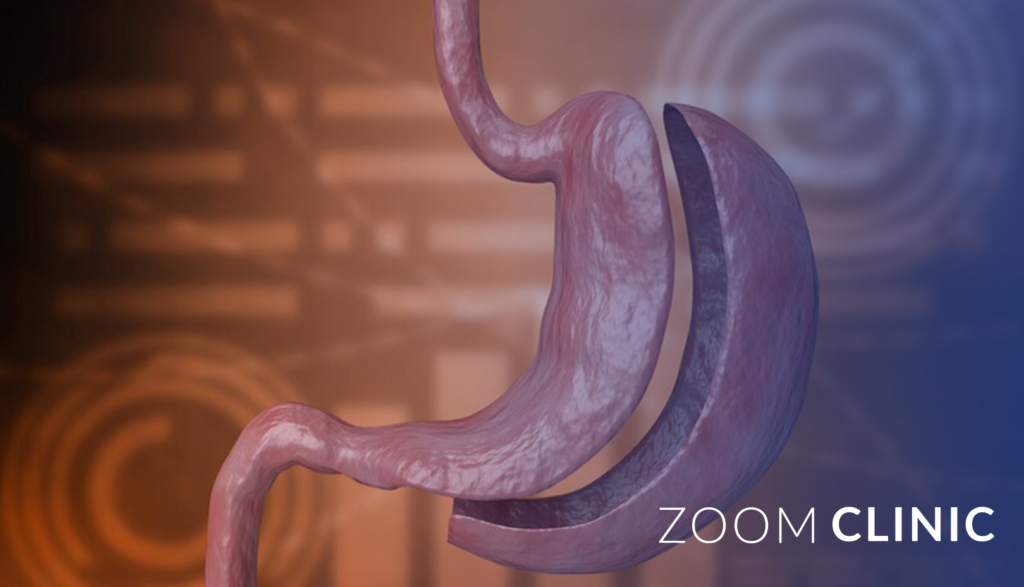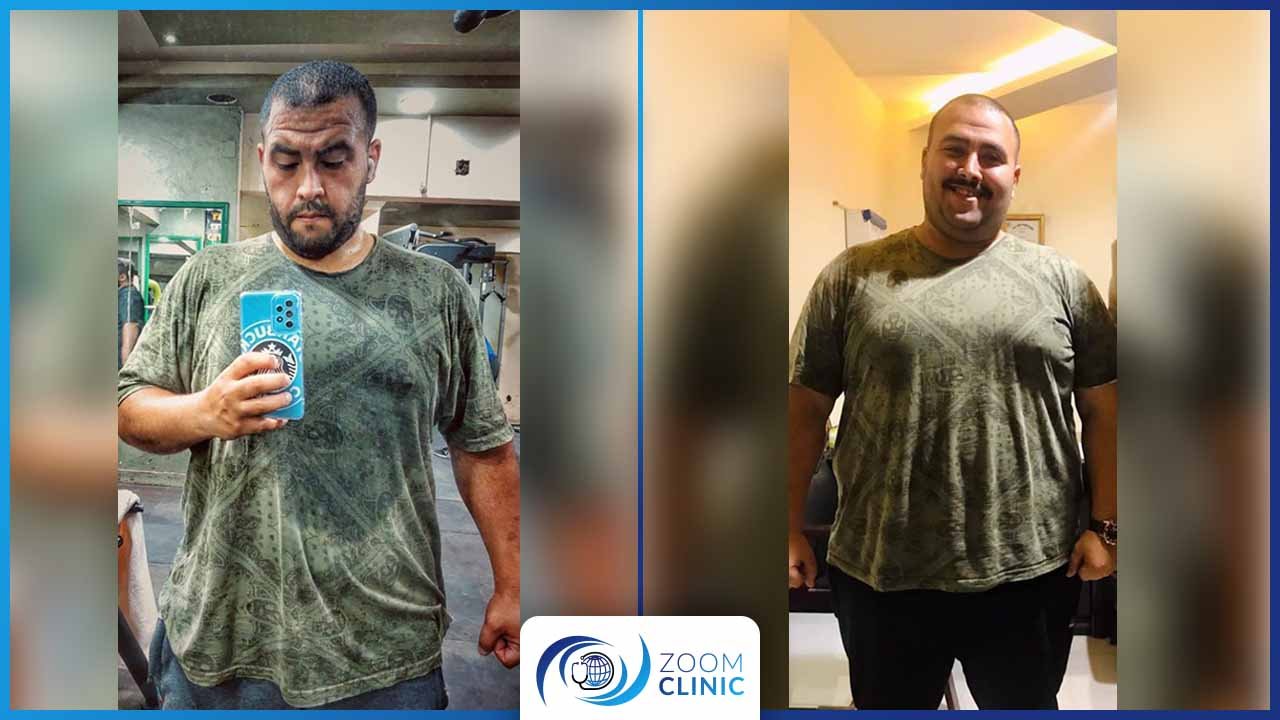Bariatric surgery has emerged as a leading solution for individuals battling severe obesity and related health conditions. Among the various surgical options available, gastric bypass surgery and gastric sleeve surgery are the most prominent.
Metabolic and bariatric surgery, endorsed by authoritative health organizations, combines these surgical interventions with lifestyle changes to achieve long-term weight loss and effectively address obesity-related health issues.
As the best gastric bypass and gastric sleeve clinic in Turkey with over a decade of experience, we understand the importance of choosing the right procedure tailored to each patient’s unique needs.
This comprehensive guide will delve deep into the difference between gastric bypass and gastric sleeve, shedding light on everything from their procedures to outcomes, to help you make an informed decision.
Table of content:
What is Gastric Bypass Surgery?
Gastric bypass surgery, often referred to as Roux-en-Y gastric bypass, is a well-established bariatric procedure. It involves creating a small pouch at the top of the stomach, effectively reducing its size. This smaller stomach pouch is then connected directly to the small intestine, bypassing a significant portion of the stomach and the first segment of the small intestine. This alteration, known as the gastric bypass procedure, not only restricts the amount of food a person can consume but also reduces the absorption of calories and nutrients.
How Gastric Bypass Works
Gastric bypass surgery helps individuals lose weight through two primary mechanisms:
- Restriction: The small stomach pouch restricts the amount of food intake, leading to early satiety.
- Malabsorption: By bypassing a portion of the small intestine, fewer calories and nutrients are absorbed, contributing to weight loss.
Benefits of Gastric Bypass
- Significant Weight Loss: Gastric bypass patients often experience more rapid and substantial weight loss compared to other bariatric procedures.
- Improvement in Obesity-Related Conditions: This procedure has a high success rate in improving or resolving conditions like type 2 diabetes, hypertension, and sleep apnea.
- Long-Term Weight Management: Gastric bypass has been shown to help maintain weight loss over the long term.
Risks and Considerations
- Nutritional Deficiencies: Due to the malabsorption component, gastric bypass patients need lifelong supplementation to avoid deficiencies in vitamins and minerals such as vitamin B12, iron, calcium, and folate.
- Dumping Syndrome: A condition where food moves too quickly from the stomach to the small intestine, causing symptoms like nausea, vomiting, diarrhea, and abdominal cramps.
What is Gastric Sleeve Surgery?
Gastric sleeve surgery, also known as laparoscopic sleeve gastrectomy, is a relatively newer bariatric procedure compared to gastric bypass.
It involves the removal of approximately 75-80% of the stomach, significantly reducing its size and ghrelin production, which helps in weight loss by decreasing hunger and calorie consumption. Unlike gastric bypass, this procedure does not alter the intestine, so the digestive process remains intact.
How Gastric Sleeve Works
Gastric sleeve surgery works primarily through restriction:
- Restriction: The smaller stomach size limits the amount of food that can be consumed, leading to reduced calorie intake.
- Hormonal Changes: The removal of the stomach portion also decreases the production of ghrelin, the “hunger hormone,” which can help reduce appetite.
Benefits of Gastric Sleeve
- Simpler Procedure: Compared to gastric bypass, gastric sleeve surgery is technically simpler, with a shorter operating time and lower risk of complications.
- Significant Weight Loss: Gastric sleeve patients typically lose 50-70% of their excess body weight within the first year.
- Improvement in Obesity-Related Conditions: Similar to gastric bypass, this procedure can also lead to significant improvements in conditions like diabetes, hypertension, and sleep apnea.
Risks and Considerations
- Risk of GERD: Gastric sleeve surgeries may exacerbate or cause gastroesophageal reflux disease (GERD).
- Irreversible: Unlike some other bariatric procedures, the gastric sleeve is permanent and cannot be reversed.
Comparing Gastric Bypass and Gastric Sleeve

Weight Loss Outcomes
When comparing gastric sleeve vs. gastric bypass in terms of weight loss, both procedures are highly effective.
However, gastric bypass patients often experience faster and more substantial weight loss. Studies have shown that gastric bypass procedures can result in an average loss of 60-80% of excess body weight within the first 18 months, whereas gastric sleeve procedures typically result in a 50-70% loss of excess weight over the same period.
Improvement in Comorbidities
Both procedures have been shown to improve or resolve obesity-related comorbidities, but gastric bypass surgeries generally have a higher success rate.
For instance, gastric bypass is particularly effective in resolving type 2 diabetes, with some patients experiencing remission within days after surgery due to changes in gut hormones.
On the other hand, the gastric sleeve procedure also improves these conditions, but the rate of remission may be slightly lower compared to bypass.
Procedure Complexity and Risks
Gastric bypass is a more complex procedure than the gastric sleeve.
It involves rerouting the intestines and requires more surgical expertise.
Consequently, the risk of complications, such as infections, leaks, or nutritional deficiencies, is slightly higher with gastric bypass.
However, at our clinic, with over 10 years of experience in gastric bypass procedures, we maintain a high standard of care, significantly minimizing these risks.
On the other hand, gastric sleeve surgery is less complex and has a lower risk profile.
The absence of intestinal rerouting means fewer long-term complications related to malabsorption, but patients are still at risk for potential issues like GERD or weight regain if dietary guidelines are not strictly followed.
Recovery Time and Post-Operative Care
Both gastric bypass and gastric sleeve surgeries require a hospital stay of 2-3 days, with most patients returning to normal activities within 2-4 weeks.
However, the recovery period can vary depending on the patient’s overall health and adherence to post-operative care guidelines.
Gastric bypass patients require more intensive follow-up care due to the risk of nutritional deficiencies. Lifelong vitamin and mineral supplementation are necessary, and regular monitoring is essential to ensure overall health and well-being.
For gastric sleeve patients, the follow-up care is somewhat less intensive but still crucial. Nutritional guidance, including a focus on portion control and healthy eating habits, is vital to achieving and maintaining weight loss goals.
Long-Term Success and Maintenance
Both procedures have been shown to be effective for long-term weight loss, but there are differences in how they sustain these results.
Gastric bypass is often more successful in maintaining long-term weight loss, primarily due to the malabsorption component. However, it also comes with a higher potential for nutritional deficiencies.
Gastric sleeve patients, while achieving substantial weight loss, must be particularly diligent in maintaining healthy eating habits to prevent weight regain.
The absence of malabsorption means that caloric intake plays a more significant role in long-term success, making lifestyle changes essential.
Suitability: Which Procedure is Right for You?
Choosing between gastric sleeve and gastric bypass depends on various factors, including your overall health, weight loss goals, and medical history. One significant factor is the body mass index (BMI), which helps determine eligibility for these surgeries. Individuals with a higher BMI are generally recommended to undergo gastric bypass surgery for more substantial weight loss. Additionally, weight-related health conditions might allow for eligibility at a lower BMI.
Gastric Bypass Might Be Right If You:
- Have severe obesity (BMI > 40) or a BMI > 35 with obesity-related conditions like diabetes.
- Have not had success with other weight loss methods.
- Suffer from severe gastroesophageal reflux disease (GERD), as gastric bypass can alleviate these symptoms.
- Are looking for a procedure with a higher likelihood of resolving obesity-related comorbidities, such as type 2 diabetes.
Gastric Sleeve Might Be Right If You:
- Have a lower BMI (35-40) and are looking for a less complex surgical option.
- Are concerned about the risks associated with malabsorption and want to avoid the necessity of lifelong vitamin and mineral supplementation.
- Are at risk for, or currently suffer from, gastrointestinal conditions that could be exacerbated by gastric bypass surgery.
What to Expect Post-Surgery
Dietary Changes
Whether you opt for gastric sleeve or gastric bypass, significant dietary changes are necessary post-surgery.
Both procedures require a transition from a liquid diet to soft foods, eventually leading to a solid diet focused on high-protein, low-fat, and low-sugar foods.
Portion control is crucial, as both surgeries significantly reduce the stomach’s capacity.
Gastric bypass patients must be particularly careful with sugar intake to avoid dumping syndrome, a condition where rapid gastric emptying leads to symptoms like nausea, vomiting, and dizziness.
Lifestyle Adjustments
Both surgeries require a commitment to lifelong lifestyle changes. Regular physical activity, adherence to dietary guidelines, and regular follow-up visits with healthcare providers are essential to achieving and maintaining weight loss.
Psychological Support
Bariatric surgery, whether gastric sleeve or bypass, can bring about significant emotional and psychological changes.
It’s important to seek support from mental health professionals, support groups, or counseling services to address these challenges and help navigate the journey to a healthier life.
Zoom Clinic clients before and after obesity treatment surgeries





Conclusion
Understanding the difference between gastric bypass and gastric sleeve is crucial for anyone considering bariatric surgery.
Both procedures offer significant benefits, but the choice between them should be made based on individual health needs, weight loss goals, and medical history.
At our clinic, we pride ourselves on offering personalized care to ensure the best possible outcomes for our patients.
Whether you’re considering gastric sleeve surgery or gastric bypass surgery, our team of experienced professionals is here to guide you every step of the way.
With over a decade of experience, we have helped countless patients achieve their weight loss goals and improve their quality of life.
If you’re ready to take the next step towards a healthier future, we invite you to contact us for a consultation.
Get the special offer today from Zoom Clinic
Read Also:
The Appropriate Ages for Gastric Sleeve Surgery: A Comprehensive Guide


